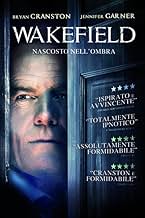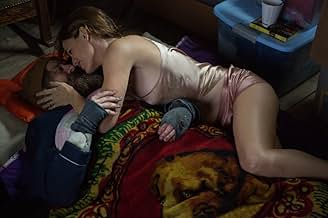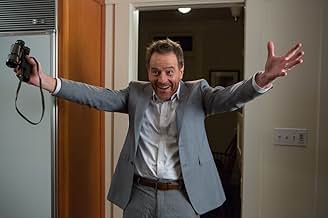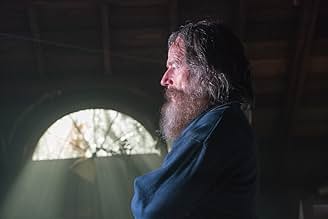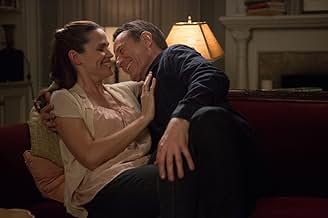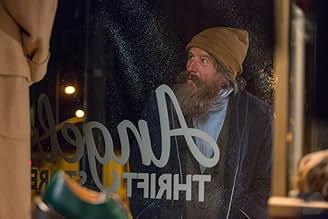AVALIAÇÃO DA IMDb
6,3/10
19 mil
SUA AVALIAÇÃO
Um advogado bem sucedido se sente sufocado pela vida que leva. Um dia ele resolve não voltar para casa e se esconde no sótão, deixando a família e a rotina por meses.Um advogado bem sucedido se sente sufocado pela vida que leva. Um dia ele resolve não voltar para casa e se esconde no sótão, deixando a família e a rotina por meses.Um advogado bem sucedido se sente sufocado pela vida que leva. Um dia ele resolve não voltar para casa e se esconde no sótão, deixando a família e a rotina por meses.
- Direção
- Roteiristas
- Artistas
- Prêmios
- 1 vitória e 1 indicação no total
Derek Alvarado
- Male Police Officer
- (as Derek Weston)
Michael Balin
- Cop
- (não creditado)
- Direção
- Roteiristas
- Elenco e equipe completos
- Produção, bilheteria e muito mais no IMDbPro
Avaliações em destaque
Greetings again from the darkness. Oscar nominated for her screenplay to The Curious Case of Benjamin Button (2008), Robin Swicord's directorial debut of The Jane Austen Book Club (2007) was not particularly impressive. However, she bounces back nicely with this Bryan Cranston vehicle and one of the more creative scripts featuring internal dialogue that's ever hit the silver screen. Cranston is showing a knack for selecting interesting projects, and he excels here as the high-powered attorney who spontaneously decides to drop out of society in a most unusual manner.
There is a ton of social commentary on display here with targets including married life, suburban living, career pressures, and self-doubt substantially summed up with a line from Cranston's character, "Most everyone has had the impulse to put their life on hold." As he proceeds through his new 'unshackled' and 'primal' lifestyle while observing the world unnoticed through the small window in his garage attic, much of his focus seems to be on discovering just who he is at his core, and what is the truth behind his relationship with his wife (Jennifer Garner). It's as if he is asking "What am I?" while clinging to his previous life in a voyeuristic way.
Ms. Swicord's screenplay is adapted from E.L. Doctorow's short story and it's sneaky in the way that it questions how we go about our daily life, and how one can "snap" emotionally if feeling unappreciated. It's a showcase for the other side of upper middle class white privilege, as well as suburban alienation that is so prevalent (and ignored) today. By dropping out but staying close, Cranston's character actually pays more attention to his family than he usually would if sitting next to them at the dinner table.
We are accustomed to a mid-life crisis involving a sports car, marital affair or sudden career change. It's highly unusual for someone to actually "disappear". It's at that point where the narration really shines it's insightful, observational and thought-provoking. Beyond that, the comedic edge is laden with sadness. The story humanizes this pretty despicable guy – or at least a guy who does a pretty despicable thing. The score is in the style of a 1980's Brian DePalma movie, which just adds to the unique cinematic experience. This is one to see for Cranston's performance, as well as for Ms. Swicord's commentary on today's way of life.
There is a ton of social commentary on display here with targets including married life, suburban living, career pressures, and self-doubt substantially summed up with a line from Cranston's character, "Most everyone has had the impulse to put their life on hold." As he proceeds through his new 'unshackled' and 'primal' lifestyle while observing the world unnoticed through the small window in his garage attic, much of his focus seems to be on discovering just who he is at his core, and what is the truth behind his relationship with his wife (Jennifer Garner). It's as if he is asking "What am I?" while clinging to his previous life in a voyeuristic way.
Ms. Swicord's screenplay is adapted from E.L. Doctorow's short story and it's sneaky in the way that it questions how we go about our daily life, and how one can "snap" emotionally if feeling unappreciated. It's a showcase for the other side of upper middle class white privilege, as well as suburban alienation that is so prevalent (and ignored) today. By dropping out but staying close, Cranston's character actually pays more attention to his family than he usually would if sitting next to them at the dinner table.
We are accustomed to a mid-life crisis involving a sports car, marital affair or sudden career change. It's highly unusual for someone to actually "disappear". It's at that point where the narration really shines it's insightful, observational and thought-provoking. Beyond that, the comedic edge is laden with sadness. The story humanizes this pretty despicable guy – or at least a guy who does a pretty despicable thing. The score is in the style of a 1980's Brian DePalma movie, which just adds to the unique cinematic experience. This is one to see for Cranston's performance, as well as for Ms. Swicord's commentary on today's way of life.
No, this movie is not like watching paint dry, it is about watching a person drop out and tune into the petty and superficial aspects of the self. Rather it's a "nervous breakdown" or not Cranston does wonders with his physiognomy and gait. No, this is not an action movie or a RomCom, but a study in character and psychology does require patience, as does sipping a good glass of wine, no need to gulp, enjoy the moments, the good and the bad.
A successful New York attorney (Bryan Cranston) lives in a nice suburban home, has been married to his wife (Jennifer Garner) for 15 years and has teenage twin daughters. He thinks about the ups and downs of their relationship, loses his job and walks out on his family. Except he is not far as he is hiding in a small room above the garage spying on his family for months from a window in the garage, watching their different stages of grief.
Cranston practically carries this film alone on this parable on human relationships and family. Not short of humour, it is both an interesting and sad study that sometimes stretches credibility.
Cranston practically carries this film alone on this parable on human relationships and family. Not short of humour, it is both an interesting and sad study that sometimes stretches credibility.
Let's start first with Bryan Cranston's performance. When watching this movie, I think it would be easy for someone to overlook just how good he is. 85% of the movie is Cranston sitting in a room talking to himself, and yet he is able to bring such dimension and drama to it. He makes it look so easy and natural, and that's why it would be easy to overlook his performance. He absolutely carries the film, and it does not work without his ability as an actor. Jennifer Garner is also really good in this movie, however she is absolutely outshined by how brilliant Cranston is. Her role was also minute enough that really anyone could have played her character, whereas I don't think just anyone could have played Howard Wakefield. What struck me most about Wakefield was how much of a character study it was. It was actually more of a situational study. What does an average human being reduce themselves to when stripped of all their possessions? When they become entirely deprogrammed from society? This idea has been explored before, in films like Cast Away, but never quite in this way...
You can talk about how misleading the narrator is, how slow paced it is, but for me it creates a meditative character study, that actually relishes how sincerely flawed our protagonist is.
Você sabia?
- CuriosidadesFilmed in 20 days.
- Erros de gravaçãoThe train Wakefield boarded from Grand Central was a diesel hauled train. A power outage might have affected the train's motion (electric trains stalled ahead etc), but it would not have affected the lights in the train given that the power comes from the diesel locomotive.
- Citações
Howard Wakefield: People will say that I left my wife and I suppose, as a factual matter, I did, but where was the intentionality? I had no thought of deserting her.
Principais escolhas
Faça login para avaliar e ver a lista de recomendações personalizadas
- How long is Wakefield?Fornecido pela Alexa
Detalhes
- Data de lançamento
- País de origem
- Central de atendimento oficial
- Idioma
- Também conhecido como
- Perdido sin rastro
- Locações de filme
- Empresas de produção
- Consulte mais créditos da empresa na IMDbPro
Bilheteria
- Faturamento bruto nos EUA e Canadá
- US$ 262.599
- Fim de semana de estreia nos EUA e Canadá
- US$ 11.299
- 21 de mai. de 2017
- Faturamento bruto mundial
- US$ 798.214
- Tempo de duração
- 1 h 46 min(106 min)
- Cor
- Proporção
- 2.35 : 1
Contribua para esta página
Sugerir uma alteração ou adicionar conteúdo ausente








